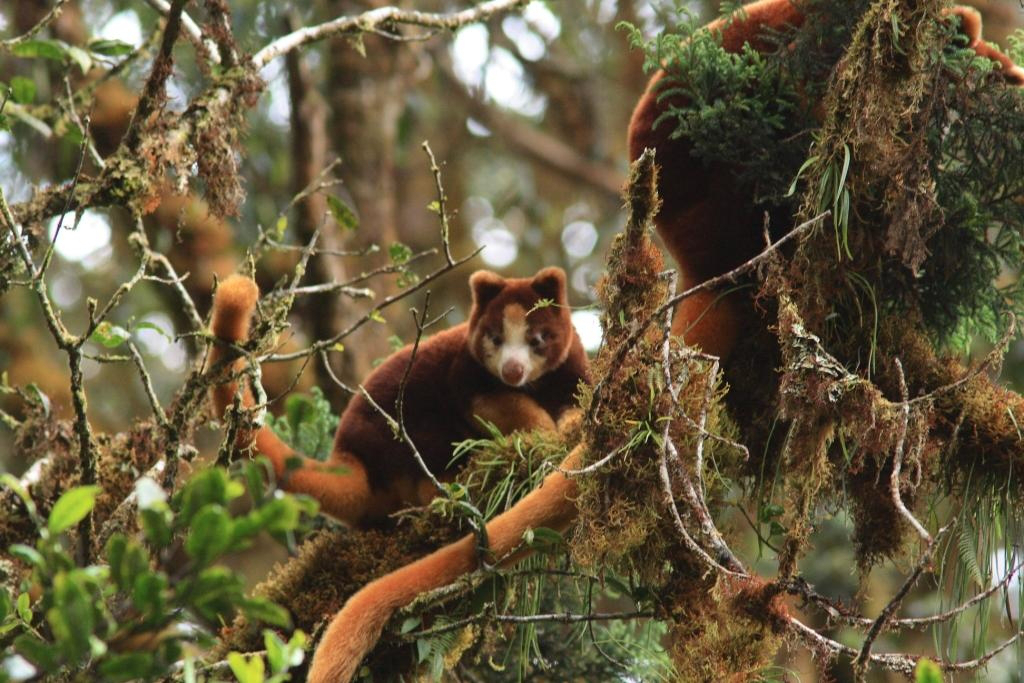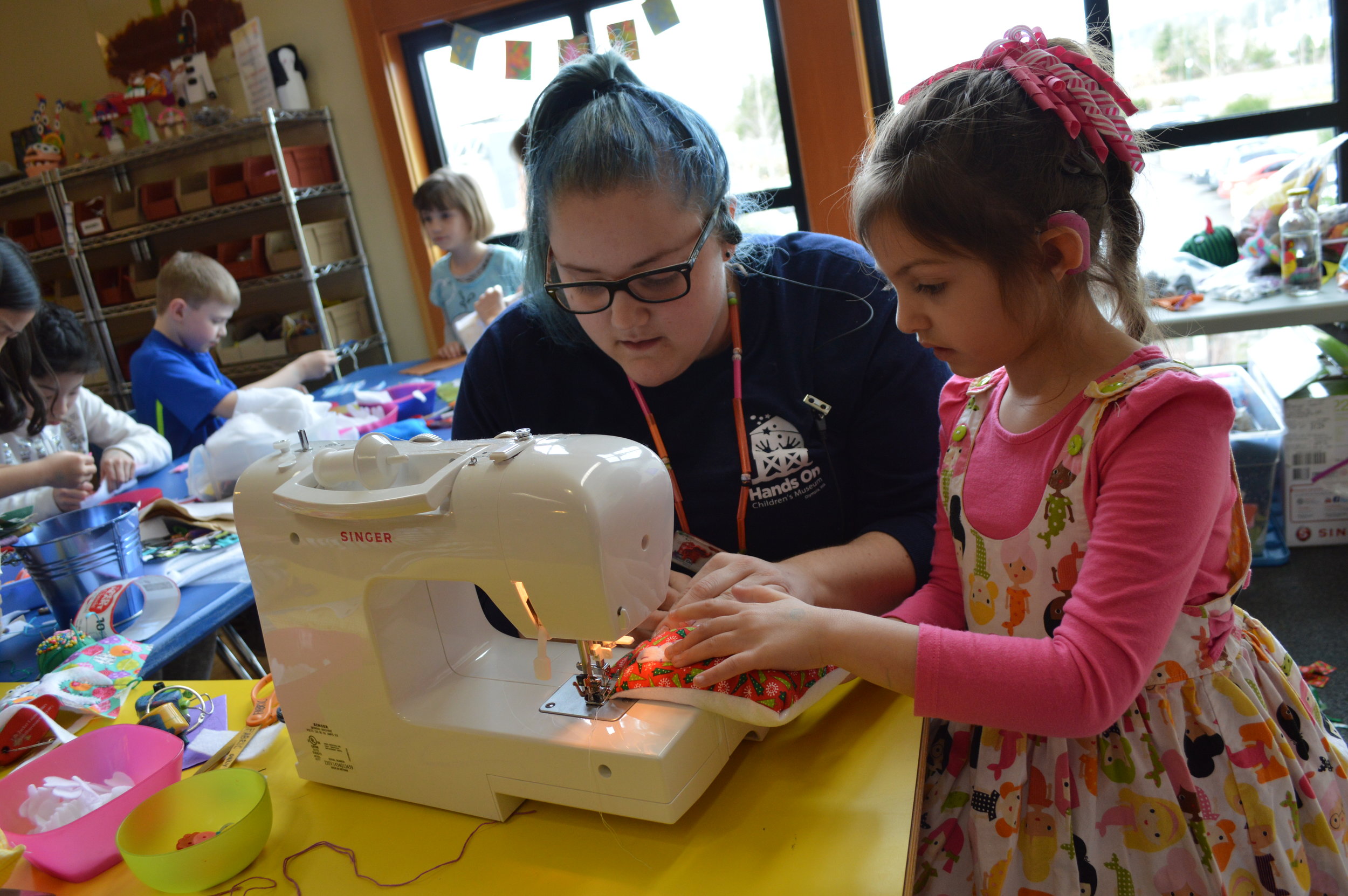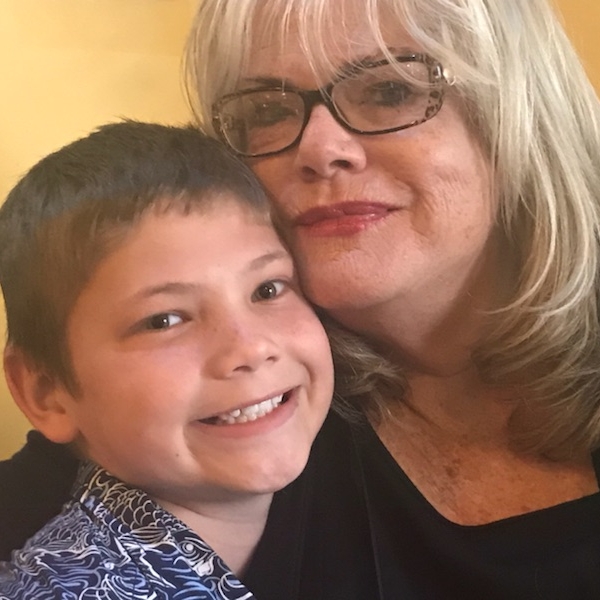Committed to the people and causes she cares about most, Kathryn Owen is like a gemstone, with so many facets (and a passion for iridescence) that she shines from the minute you meet her. Warm and inviting, Kathryn captures what makes human beings tick—and wildlife, too. In fact, in chatting with her, you might come to believe that she can talk to the animals, too, having brought her special talents to zoos, aquariums, nature centers and wildlife conservation groups.
“Tree kangaroos are marvelous creatures, the essence of adorableness,” enthuses Kathryn. “When you first see them, it’s as if a child has left a stuffed critter up in a tree.”
Along the path of her storied career, Kathryn worked as an evaluator for the Tree Kangaroo Conservation Project in Papua New Guinea. Haven’t heard of tree kangaroos before? It’s a fact: kangaroos in that part of the world are arboreal.
A massive plot of privately-owned land, running from the mountains to the ocean, had been set up as a preserve for the tree kangaroos and other indigenous species. Kathryn’s mission: to help develop an international monitoring and evaluation plan for the community-based program, sponsored by the Woodland Park Zoo in Seattle.
“I educated and trained staff both here and on the ground in Papua New Guinea so that they could assign roles, clarify goals, strengthen strategy and document the impact of their work,” she explains.
“They’ve got 20 years of this enormous project under their belts. It’s enriched by many different program components, including health care improvements, employment opportunities and a shade-grown coffee enterprise that supplies Seattle’s Caffe Vitta. And they are now in a position where it’s so important that they identify what they really want to accomplish and set up systems that will allow them to track their progress.”
With over 20 years of experience in the non-profit sector as an educator, community organizer and evaluator, Kathryn’s clients have also included the Minnesota and Phoenix zoos; the Oregon Coast Aquarium; the Margaret A. Cargill Foundation and the Pacific Whale Foundation. She’s also applied a knowing hand to the Stillwaters Environmental Center in Kingston and the Hands-On Children’s Museum in Olympia, among others.
Get ready for a woman of influence who keeps it real.
Kathryn’s work has included projects with the Hands On Children’s Museum in Olympia, where kids are given the chance to be Makers.
How are evaluators helping to change the world?
Kathryn: I read one time that evaluators are like detectives. Being an evaluator feels like that at times, trying to uncover the truth. I also feel it’s helping people to think clearly about what they’re hoping to accomplish and then figuring out how to make that happen.
The museums and learning organizations I work with want to have a broader impact. My job is to help them develop the talent of asking the big questions about the work that they do, then gather those insights and apply them to a course of action.
In the ‘60s and ‘70s, monitoring and evaluation used to be much more about judgment. With the era of Johnson and Kennedy a lot of money went into social programs for the first time, really, in a significant way. Along with that came the expectation of making a difference. Were we reducing poverty, for instance? Expanding access to education? Clean water and clean air acts had been activated, but were things changing for the better?
data-animation-override>
“The museums and learning organizations I work with want to have a broader impact. My job is to help them develop the talent of asking the big questions about the work that they do, then gather those insights and apply them to a course of action.”
From what I’ve been able to research that’s really where the profession of evaluation in North America had its big growth spurt. In the 21st century, we’ve moved from being external judges into seeing ourselves as partners or a “critical friend” – that frame of reference. We’re on your side, asking good questions, encouraging you, helping you understand when, if and how you’ve gotten where you need to be – that you’ve arrived.
What’s the biggest challenge that nonprofits face these days?
Kathryn: Because government is not always providing the social services it has in the past, the big issue these days is whether and how nonprofits pick up the slack. And there are additional challenges to consider these days, like climate change. There are so many needs that aren’t being met; nonprofits are constantly in danger of their scope expanding beyond what’s sustainable. It’s a delicate dance. Understanding their audience—their needs and interests—and being serious about measuring their impact can really help organizations sort these things out and become clearer about their missions.
How would you describe yourself?
Kathryn: I would say creative, enthusiastic. I have a lot of empathy and caring for animals, and people, but especially children. I tell good jokes. A good sense of humor. And a storyteller.
You’re an artist at heart!
Kathryn: Very much later in life! I just started sketching, maybe three years ago. I sketch my surroundings when I go on a trip; tend to do it as a way of keeping a journal. I do nature journaling, and I do it mostly to pay attention. I find I really remember an experience that way, much more so than with a photograph. It helps me get—and keep—a sense of the places I’ve been.
I’m super concerned about the future of nature and the planet. Sketching is a way of staying close to plants and animals that won’t necessarily be here forever. It’s an outlet that relates directly to the work I do, with a lot of focus on conserving wildlife, protecting Mother Nature and providing rich environments for children to grow up in.
Is there a highlight you can share from some of your recent work?
Kathryn: A project I just love—and would love to do more of—is working with a national foundation that supports animal welfare organizations. The foundation, having given out significant monies, asked what these organizations and their staff felt they’d been able to accomplish.
data-animation-override>
“I’m super concerned about the future of nature and the planet. Sketching is a way of staying close to plants and animals that won’t necessarily be here forever. It’s an outlet that relates directly to the work I do, with a lot of focus on conserving wildlife, protecting Mother Nature and providing rich environments for children to grow up in.”
I created a batch of case studies on these organizations, which involved interviewing vets, shelter directors, care takers, adoption counselors, etc. I got a real feel for the difference the foundation was making – how many animals were being saved and the impact of support for people who couldn’t otherwise afford medical care for their pets. I really enjoyed the chance to tell these stories, giving my client real evidence that their contribution was a success. It also gave them food for thought about areas in which they might like to be more successful.
How does Vibe help your creative streak?
Kathryn: I think it gives me the ability to focus in a way that I don’t seem to be able to do at home. I really concentrate and get a lot of work done at Vibe.
I’m meeting people with a lot of different interests and in a lot of different spaces of the local economy. Most of my clients are outside of Kitsap, so being here connects me to this community. It’s really helpful in terms of knowing what’s going on in the county and about all the resources here.
When did Iridescence Consulting come about?
Kathryn: Oh, I haven’t gotten my cards or changed my company name yet. I was never happy about naming a business after myself, as I had been doing. In the branding workshops that RFG Creative and Vibe offered last winter/spring, the word “iridescence” came up in conversation.
data-animation-override>
“[Being at Vibe] gives me the ability to focus in a way that I don’t seem to be able to do at home. I really concentrate and get a lot of work done at Vibe… Most of my clients are outside of Kitsap, so being here connects me to this community.”
I feel like that lets clients know I help shed light and highlight the positive things they’re accomplishing. Iridescence means luminous, reflecting light, changing colors. I like what that says about the work I do.
What does ‘culturally responsive evaluation’ mean?
Kathryn: It really means being aware of the cultural lens that we ourselves bring to any endeavor, whether you’re an evaluator or in any other job. Taking into account that people come from many different cultural perspectives and life experiences—and honoring that.
A simple example: in working at Point Defiance Zoo and Aquarium, they have a program that fosters empathy with animals and with each other. Many of the children in the school being served speak Spanish as their first language. So, in that case, it’s about ensuring that when we evaluate the program through, for example, written surveys, we make sure to use language that all children understand, and allow them to express themselves in their native language.
Where is your favorite place you’ve ever lived?
Kathryn: Probably here, Poulsbo. I’ve always lived in large cities before, like Boston, Phoenix, Milwaukee, Portland, Seattle. So just living in a community where I know people when I go downtown or into a store. Never had that experience really.
Neighborhoods are closely knit here. My husband Greg and I are really enjoying that. He’s an IT director at a private middle and high school in Seattle, and now he’s taken up pottery since we’ve been living here. That’s a nice combination—throwing pots and doing IT.
What’s your happiest memory from childhood?
Kathryn: I grew up in Bellevue, which was not as large as it is now. It was still a suburb, but it didn’t have a small-town feel even then. My parents always took us hiking, skiing and camping. We’d go to Spirit Lake and Mount St. Helens—before it blew up, of course!
All these outdoor experiences as a child, well, there’s a lot of research documenting that when you have that early on in life, exploring nature in an open-ended way, it has a lifelong effect in terms of stewardship. You’re more likely to take care of the natural world, with affinity and affection. It definitely did that for me. When I volunteered at a zoo as an adult I picked up that connection again that I’d had as a little kid.
Favorite restaurant in Kitsap?
Kathryn: We really like Thai food, so Sawatdi on Bainbridge. It’s in a strip mall with a gas station, but really amazing food. It looks like a hole in the wall from the outside, but has a beautiful interior. It’s really a surprise.
Do you like roadtrips?
Kathryn: I do. My favorite, I think, was when my husband and I camped all the way from Boston to Seattle when we moved across the country. Many years ago, we lived in Mexico for a while and did a couple of wonderful road trips around the Yucatan peninsula.
If you were to name the best book ever written, what would it be?
Kathryn: I think probably To Kill a Mockingbird. I’ve been thinking about it a lot recently for some reason. I really love that book. With the last presidential election, I’ve just been thinking more about barriers between people, how people that are different than us are treated, and it definitely has those themes.
Do you have any pets?
Kathryn: I do. We have four cats. Feely (short for Ophelia), Jeffrey, Squeak and Wally. Wally is the youngest, about three years old, a very large orange and fluffy cat. I think he’s the most creative and clever of them. I also volunteer at the Kitsap Humane Society, walking dogs, so I get a dog fix. I really like all of those critters. I really want to help the underdog!
Meet the author: Vibist Susan O’Meara is a Poulsbo-based freelance writer, editor and journalist with global experience. Back in the day, Susan did event marketing for the electrified Don King, boxing’s bad-boy biz whiz. Then she got roped into writing and producing TV spots for Love Boat: The Next Wave, the ‘90s reboot, and nonfiction programming for Showtime (e.g., Roswell: The Real Story). She’s not sure which was more surreal—going with the flow of those Hollywood highs, so to speak, or navigating Nairobi’s magazine scene. Susan has worked in the US and abroad for the likes of Bloomberg Media, Deloitte, Discovery Communications, and the United Nations. She’s obsessed with wrangling language and messaging that helps brands, businesses, and individuals to grow and shine. Except when it comes to Don King’s hair.




